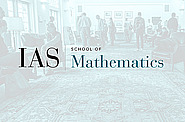Events and Activities
Explore current and upcoming events and activities happening at the Institute for Advanced Study.
Feb
10
2026
Computer Science/Discrete Mathematics Seminar II
A Complexity Lower Bound on Algebra Isomorphisms
Jeongwan Haah
10:30am|Simonyi 101 and Remote Access
Feb
10
2026
Rutgers University Astrophysics Seminar
Turn down the noise, turn up the planets
John Michael Brewer
11:00am|Serin Hall Rm 330W, Rutgers and Zoom
Feb
10
2026
Institute for Advanced Study / Princeton University Bahcall Lunch
12:30pm|PU, Lewis Library Treehouse
Feb
10
2026
Princeton University Computational Astrophysics Club
General discussion
2:00pm|Peyton Hall, Grand Central
Feb
10
2026
Analysis and Mathematical Physics
Linear Stability of Shrinking Ricci Solitons and First Eigenvalue Estimates
2:30pm|Simonyi Hall 101 and Remote Access
Feb
10
2026
Princeton University Dark Cosmos Seminar
Cosmological concordance from the early universe to the near field
4:00pm|Jadwin Hall, Joe Henry Room
Feb
10
2026
Amateur Astronomers Association of Princeton (AAAP) Monthly Meeting
From Sloan to Rubin: A Journey Through the Age of Sky Surveys
John Bochanski
7:30pm|Peyton Hall & Zoom
Feb
11
2026
Feb
12
2026
IAS Quantum Aspects of Black Holes Group Meeting
The Phase of de Sitter Higher Spin Gravity
11:00am|Bloomberg Hall Physics Library & Zoom
Feb
12
2026
Institute for Advanced Study Astrophysics Seminar
Theory for innovative cosmological tests of dark matter-baryon interactions
Yacine Ali-Haimoud
11:00am|Bloomberg Lecture Hall


